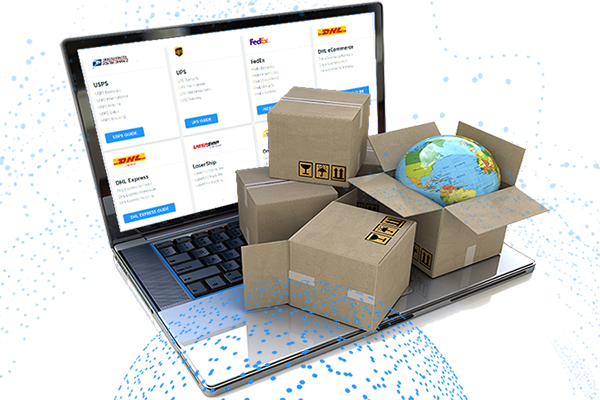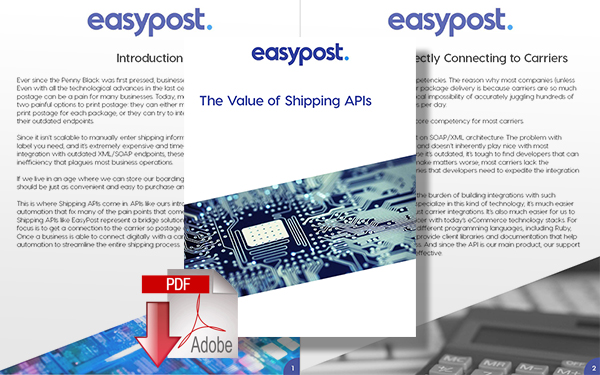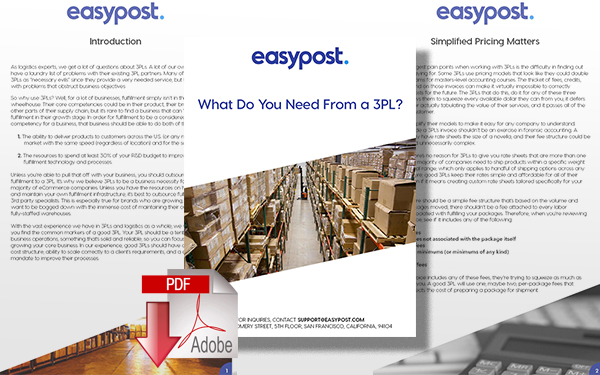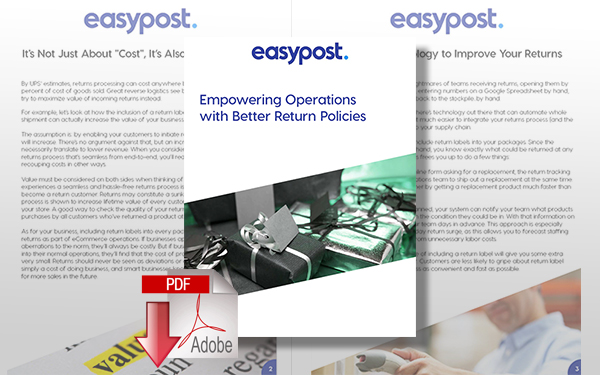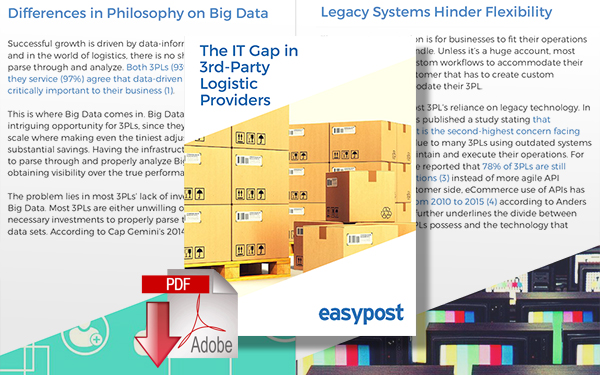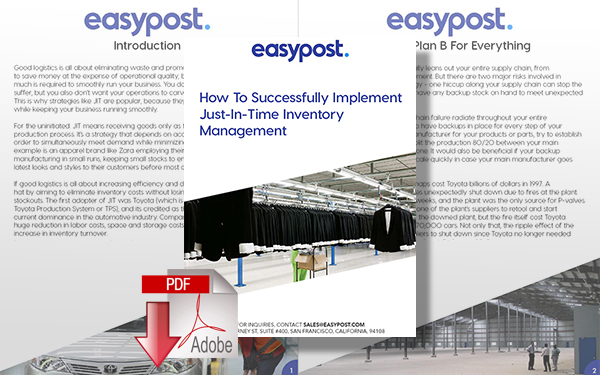Selecting the Right Shipping Carrier
For eCommerce businesses across the globe, selecting the right shipping carrier is a critical aspect to completing any purchasing cycle.
Thanks to trailblazers like Amazon, consumer expectations are erupting with time-sensitive delivery demands, so it's critical to sort and select shipping carrier partnerships based off of key performance categories like pricing, timeliness, tracking capabilities now more than ever.
But how does a growing company choose the perfect carrier to deliver every order, every time?
This article helps eCommerce business owners understand the importance of selecting the best carrier to deliver products in a way that celebrates cost savings for businesses while helping to convert one-time buyers into repeat customers.
To better show the relationship between online brands and the carriers they choose, this discussion compares the “then” and “now” of finding the right carrier and their impacts on business.
The old and expensive answer to this question is through manual pricing practices.
Having a team of analysts contact individual carriers to determine their carrying rates is both extremely time consuming and opens the door to human error, versus the new age practice of automating the carrier rating process with EasyPost's Rating API that allows businesses to rate shop across 100+ carriers already integrated with EasyPost.
The Old Way: Best-Guess Shipping Carrier Selections
Traditionally, sourcing for a carrier meant going to their websites one-by-one and manually entering a variety of order-specific details until they find what appears like a carrier with shipping terms that agree with their product type and duration of transportation.
While this method is still used amongst many high-volume shippers, forward-thinking online brands should take two significant drawbacks into consideration in order to grow brands.
The first and most obvious snag is that searching for individual carriers is time-consuming. Not only that, but this method is also labor-intensive for shipping analysts seeking to evaluate individual carrier opportunities, considering that no two carriers require the same integration process.
This malpractice leads to the second major disadvantage of the best-guess approach to finding a shipping carrier; human error. Manually inputting shipping details combined with on-the-fly human calculation required to produce a quote creates the potential for miscalculations by way of human error.
This seemingly minor mistake can carry heavy financial impact to your business and its ability to move product for demanding customers.
The New Way: Automation and Leveraging Data
Inventory: Up-To-Date Data
Gaps or flaws in your inventory data (weight and dimensions) can have major repercussions on the remainder of your supply chain. Basic information like the weight and dimensions of your products is critical to receive an accurate quote. Before considering integration with a new shipping carrier, it's critical to evaluate your inventory data to ensure it's valid, complete, up-to-date and connected to your business' shipping workflows.
Use data to optimize the packing process
Your business keeps basic inventory details on files like the weight, height, and width, but what about your packaging method? Have you considered the most cost-effective approach for all of your products? To select the ideal carrier to deliver your products to online buyers, you need to consider these questions to help your business identify the best, most cost-effective packaging option.
Diversify Your Carrier Network
Despite much shipping-dependent business' concerns on losing volume-based tariff rates, improving your chances of finding the best carrier for every order, every time hinges on broadening your carrier network. If you find your business in this same position, it's important to consider the following:
If your business and your customers gain real value from maintaining volume discounts with a specific carrier, that doesn't mean you can't add new carriers to your mix.
If you stand to save money on shipping by adding new carriers to your network, you are likely not receiving as steep of volume discounts from your primary carrier as you may think.
Verify Carrier Purchase Decisions with Data
Simple, outdated APIs typically don't have the capabilities to pull all the information needed to help eCommerce businesses make a well-informed decision on carrier partnerships, considering they carry such significant impacts on your brand's image. Areas of information that old carrier APIs don't take into consideration usually include:
- Estimated inventory value
- Package dimensions
- Package weight
- Origin warehouse(s)
- Destination characteristics
- Freight class
The main takeaway is that through working with a tech-centric shipping expert, like EasyPost, you can include more data specific to your inventory than ever before. Scoping for the next best carrier partnership becomes much easier for all members involved when you can serve more information about your specific shipping needs.
Activate Automation
The before-mentioned issue of human error is dodged when your business starts using automated solutions for logistical preparations. Our shipping APIs continually learn with the new data received from our customers' online shoppers, so your business can make knowledgeable decisions in the future that help customers engage more with your brand.
Other Aspects of Selecting a Carrier to Keep In Mind
Inventory Weight & Dimensions
What type of products are you shipping to customers? Before considering an eCommerce shipping carrier, it's critical that you evaluate the sizing and weight of your inventory. For example, shipping small packages via EasyPost's flat rate may be the best option for your business unless you are shipping larger products. In that case, the shipping costs are typically dependent on the weight of your products.
End Destination
Where are your products going? Although well-known carriers like UPS, DHL and FedEx are first to come to mind for more online business owners, we recommend exploring trusted regional carriers to determine if you can gain even more discounts on the transportation of your products. EasyPost supports integrations with 100+ carriers allowing our customers to choose from a library of national and local carriers.
Carrier Track Record
What's the carrier's reputation? Think of the shipping carrier you work with as an extension of your business. Both your business as well as your customers depend on the carrier you choose to deliver online orders safely and on-time. Carriers can be the difference between retaining happy customers or facing the backlash of negative reviews from a bad delivery experience. That said, your business can avoid these frustrating and unnecessary customer service pitfalls when you vet carrier candidates through measures like background checks of carrier performances and by reviewing their online testimonials from past customers.
The Solution: EasyPost's Carrier Rating API
By integrating with our Rating API, business owners leverage a variety of benefits all designed to help them grow their brand including:
- Rate Shop - Opposed to dedicating staff members and production hours to “fishing” for carrier quotes, allow our Rating API to compare rates across 100+ carriers in real-time. This simple process allows you to target the perfect price for your business and your customers.
- Hone Your Business Logic - Enhance the level of service you provide your customers by programming our customizable Rating API to select between individual levels of carrier services based on customer locations, order details and, of course, a cost that's important to your business and customers alike.
- Latency-Free Label Generation - By utilizing our unique rating logic, your business gains the ability to generate and print shipping labels at a location of your choice. What's this mean for your day-to-day production? Simplifying the carrier pick-up process from your facility, so orders are prepared for delivery faster.
EasyPost's shipping and logistics solutions don't end with the cutting edge Rating API. We offer a single-source solution to simplify everything from carrier rating, address verification and label printing to real-time tracking and more.
Leverage EasyPost's Data-Driven Shipping Solutions
Today you learned how your business can simultaneously reduce operating costs, reduce transit time while increasing your customer acquisition rate. Whomever you choose to transport your products during the delivery phase is equally as important as how you choose to manufacture your products. Each step is a piece of the whole picture that is your brand; it's reputation and its ability to continue growing in a market with aggressive competitors.
If you have any questions regarding the EasyPost Rating API or selecting the right carrier for your business needs in general, contact an EasyPost API specialist for a FREE consultation.
Related Article: End Delivery Nightmares by Addressing Verification & Shipment Tracking APIs
Download Related Papers
The True Value of Shipping APIs
In this paper we detail the true value of Shipping APIs, it isn't just the money you save from expensive carrier integrations, it's in the automation that it introduces to your shipping operations. Download Now!
What Do You Need From a 3PL?
This paper helps you find the common markers of a good 3PL and details how your 3PL should be a tentpole of your business operations, something that’s solid and reliable, so you can focus on your growing your core business. Download Now!
Empowering Shipping Operations with Better Return Policies
In this 'paper' we describe how businesses that are better about returns will hold a substantial advantage over those who don’t, it’s that simple! Download Now!
The IT Gap in 3rd Party Logistics Providers
This paper details how the IT Gap - or the gap between the technologies a 3PL provides and what a customer needs - is becoming a bigger problem as customers demand more agile fulfillment. Download Now!
How to Successfully Implement a Just-in-Time Inventory Management System
The takeaway in this paper is that just-in-time can be a boon for your operations if you implement it, but mitigating risk by having backup manufacturers or carriers would be a prudent move since you never know what will happen. Download Now!
Article topics
Email Sign Up

